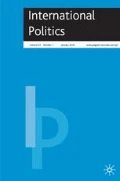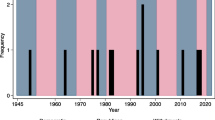Abstract
In this article we present several important first steps toward understanding the role of academics in shaping US foreign policy – identifying their policy views on one of the most salient foreign policy issues of this generation, the US War in Iraq; exploring how those views differ from public opinion more generally; and assessing the extent to which scholarly opinion was reflected in the public debate. To determine how IR scholars’ views on the invasion of Iraq differed from those of the public, we compare the answers of IR scholars at US colleges and universities to those of the US public on similar opinion survey questions. To this end, we analyze data from a unique series of surveys of IR scholars conducted by the Teaching, Research, and International Policy project.








Similar content being viewed by others
References
Abelson, D.E. (1996) American Think Tanks and Their Role in U.S. Foreign Policy. New York: Palgrave Macmillan.
Abelson, D.E. (2002) Do Think Tanks Matter: Assessing the Impact of Public Policy Institutes. Montreal, Canada: McGill-Queen’s University Press.
Abelson, D.E. (2006) A Capitol Idea: Think Tanks and U.S. Foreign Policy. Montreal, Canada: McGill-Queen’s University Press.
Adler, E. (1992) Emergence of cooperation: National epistemic communities and the international evolution of the idea of nuclear arms control. International Organization 46 (1): 101–145.
Adler, E. and Haas, P.M. (1992) Conclusion: Epistemic communities, world order, and the creation of a reflective research program. International Organization 46 (1): 367–390.
Almond, G.A. (1950) The American People and Foreign Policy. New York: Harcourt Brace.
Avey, P. and Desch, M.C. (2014) What do policymakers want from us? Results from a survey of current and former national security decision-makers. International Studies Quarterly 58 (4): forthcoming.
Baum, M.A. and Potter, P.B.K. (2008) The relationships between mass media, public opinion, and foreign policy: Toward a theoretical synthesis. Annual Review of Political Science 11 (1): 39–65.
Berinsky, A.J. and Druckman, J.N. (2007) Public opinion research and support for the Iraq war. Public Opinion Quarterly 71 (1): 126–141.
Campbell, P. and Desch, M.C. (2013) Rank irrelevance: How academia lost its way. Foreign Affairs, http://www.foreignaffairs.com/articles/139925/peter-campbell-and-michael-c-desch/rank-irrelevance.
Demeritt, D. (2001) The construction of global warming and the politics of science. Annuals of the Association of American Geographers 91 (2): 307–337.
Drake, W.J. and Nicolaidis, K. (1992) Ideas, interests, and institutionalization: ‘Trade in services’ and the Uruguay round. International Organization 46 (1): 37–100.
Drezner, D. (2013) On the foreign policy community and the IR academy in 2002. Foreign Policy Blog 21 February, http://www.foreignpolicy.com/posts/2013/02/20/on_the_foreign_policy_community_and_the_international_relations_academy_in_2002.
Feaver, P.D. and Gelpi, C. (2004) Choosing Your Battles. Princeton, NJ: Princeton University Press.
Gallucci, R. (2012) How scholars can improve international relations. Chronicle of Higher Education, 26 November, http://chronicle.com/article/How-Scholars-Can-Improve/135898/.
Gelpi, C., Feaver, P.D. and Reifler, J. (2005) Casualty sensitivity and the war in Iraq. International Security 30 (3): 7–46.
Haas, P.M. (1989) Do regimes matter? Epistemic communities and Mediterranean pollution. International Organization 43 (3): 377–403.
Haas, P.M. (1990) Obtaining international environmental protection through epistemic consensus. Millennium Journal of International Studies 19 (3): 347–363.
Haas, P.M. (1992) Epistemic communities and international policy coordination. International Organization 46 (1): 1–35.
Holsti, O.R. and Rosenau, J.N. (1977) The meaning of Vietnam: Belief systems of American leaders. International Journal 32 (3): 452–474.
Jackson, R. (2007) Towards an understanding of contemporary intrastate war. Government and Opposition 42 (1): 121–128.
Jackson, P. and Kaufmann, S. (2007) Security scholars for a sensible foreign policy: A study in Weberian activism. Perspectives on Politics 5 (1): 95–103.
Jacobs, L.R. and Page, B.I. (2005) Who influences U.S. foreign policy? American Political Science Association 99 (1): 107–123.
Jacobson, G.C. (2007) A Divider, Not a Uniter. New York: Pearson Longman.
Jentleson, B. (2002) The need for praxis: Bringing policy relevance back in. International Security 26 (4): 169–183.
Jordan, R., Maliniak, D., Oakes, A., Peterson, S. and Tierney, M.J. (2009) One Discipline or Many?: TRIP Survey of International Relations Faculty in Ten Countries. Williamsburg, VA: Institute for the Theory and Practice of International Relations.
Kam, C. and Kinder, D. (2007) Terror and ethnocentrism: Foundation of American support for the war on terrorism. Journal of Politics 69 (2): 320–338.
Kristof, N. (2014) Professors, we need you! New York Times 15 February, http://www.nytimes.com/2014/02/16/opinion/sunday/kristof-professors-we-need-you.html?_r=0.
Maliniak, D., Oakes, A., Peterson, S. and Tierney, M.J. (2007a) The View from the Ivory Tower: TRIP Survey of IR Faculty in the U.S. and Canada. Williamsburg, VA: Institute for the Theory and Practice of International Relations, College of William and Mary.
Maliniak, D., Oakes, A., Peterson, S. and Tierney, M.J. (2007b) Inside the ivory tower. Foreign Policy March/April.
Maliniak, D., Oakes, A., Peterson, S. and Tierney, M.J. (2011) International relations in the U.S. academy. International Studies Quarterly 55: 437–464.
Maliniak, D., Peterson, S. and Tierney, M.J. (2012a) TRIP Around the World: Teaching, Research, and Policy Views of IR Faculty in 20 Countries. Williamsburg, VA: Institute for the Theory and Practice of International Relations, College of William and Mary.
Maliniak, D., Powers, R. and Tierney, M. (2012b) Are there neoconservative wolves in the realist flock? Foreign Policy.com blog post, 25 January, http://drezner.foreignpolicy.com/posts/2012/01/25/realism_episode_iii_return_of_the_realist_critics.
Mearsheimer, J.J. and Walt, S.M. (2003) An unnecessary war. Foreign Policy 134: 51–59.
Mueller, J.E. (1973) War, Presidents, and Public Opinion. Lanham, MD: University Press of America.
Mueller, J.E. (1994) Policy and Opinion in the Gulf War. Chicago, IL: University of Chicago Press.
Newsom, D.D. (1995–6) Foreign policy and academia. Foreign Policy 101 (Winter): 52–67.
Nye, J. (2009) Scholars on the sidelines. Washington Post 13 April, http://www.washingtonpost.com/wp-dyn/content/article/2009/04/12/AR2009041202260.html.
Oldendick, R.W. and Bardes, B.A. (1982) Mass and elite foreign policy opinions. Public Opinion Quarterly 46 (3): 368–382.
Peterson, S., Tierney, M.J. and Maliniak, D. (2005a) Teaching and Research Practices, Views on the Discipline, and Policy Attitudes of International Relations Faculty at U.S. Colleges and Universities. Williamsburg, VA: Reves Center for International Studies, College of William and Mary.
Peterson, S., Tierney, M.J. and Maliniak, D. (2005b) Inside the ivory tower. Foreign Policy 151 (November/December): 58–64.
Rathbun, B. (2012) Politics and paradigm preferences: The implicit ideology of international relations scholars. International Studies Quarterly 56 (3): 607–622.
Rosati, J.E. and Creed, J. (1997) Extending the three- and four-headed eagles: The foreign policy orientations of American elites during the 80s and 90s. Political Psychology 18 (3): 583–623.
Rosenau, J. (1961) Public Opinion and Foreign Policy. New York: Random House.
Walt, S. (2005) The relationship between theory and practice in international relations. Annual Review of Political Science 8 (1): 23–48.
Walt, S.M. (2009) The cult of irrelevance. Post on Foreign Policy blog 15 April, ‘Stephen M. Walt, A realist in an ideological age’.
Wiarda, H.J. (2010) Think Tanks and Foreign Policy: The Foreign Policy Research Institute and Presidential Politics. New York: Lexington Books.
Wittkopf, E. (1990) Faces of Internationalism: Public Opinion and American Foreign Policy. Durham, NC: Duke University Press.
Woodward, B. (2004) Plan of Attack: The Definitive Account of the Decision to Invade Iraq. London: Simon and Schuster UK.
Author information
Authors and Affiliations
Corresponding author
Appendix
Appendix
Rights and permissions
About this article
Cite this article
Long, J., Maliniak, D., Peterson, S. et al. Knowledge without power: International relations scholars and the US war in Iraq. Int Polit 52, 20–44 (2015). https://doi.org/10.1057/ip.2014.38
Published:
Issue Date:
DOI: https://doi.org/10.1057/ip.2014.38




